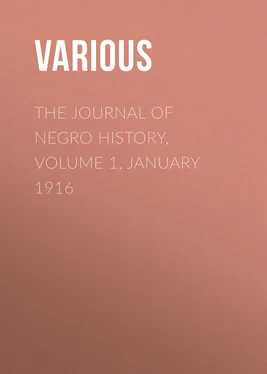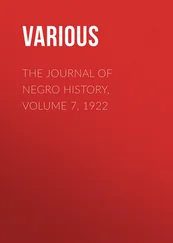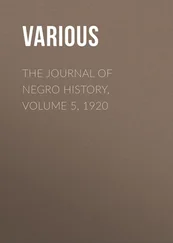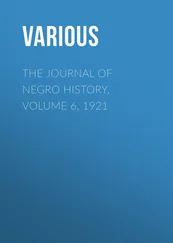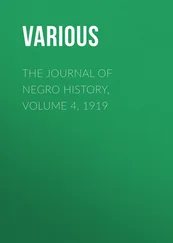Various - The Journal of Negro History, Volume 1, January 1916
Здесь есть возможность читать онлайн «Various - The Journal of Negro History, Volume 1, January 1916» — ознакомительный отрывок электронной книги совершенно бесплатно, а после прочтения отрывка купить полную версию. В некоторых случаях можно слушать аудио, скачать через торрент в формате fb2 и присутствует краткое содержание. Жанр: foreign_antique, periodic, История, foreign_edu, на английском языке. Описание произведения, (предисловие) а так же отзывы посетителей доступны на портале библиотеки ЛибКат.
- Название:The Journal of Negro History, Volume 1, January 1916
- Автор:
- Жанр:
- Год:неизвестен
- ISBN:нет данных
- Рейтинг книги:5 / 5. Голосов: 1
-
Избранное:Добавить в избранное
- Отзывы:
-
Ваша оценка:
- 100
- 1
- 2
- 3
- 4
- 5
The Journal of Negro History, Volume 1, January 1916: краткое содержание, описание и аннотация
Предлагаем к чтению аннотацию, описание, краткое содержание или предисловие (зависит от того, что написал сам автор книги «The Journal of Negro History, Volume 1, January 1916»). Если вы не нашли необходимую информацию о книге — напишите в комментариях, мы постараемся отыскать её.
The Journal of Negro History, Volume 1, January 1916 — читать онлайн ознакомительный отрывок
Ниже представлен текст книги, разбитый по страницам. Система сохранения места последней прочитанной страницы, позволяет с удобством читать онлайн бесплатно книгу «The Journal of Negro History, Volume 1, January 1916», без необходимости каждый раз заново искать на чём Вы остановились. Поставьте закладку, и сможете в любой момент перейти на страницу, на которой закончили чтение.
Интервал:
Закладка:
But the custom of neglecting those slaves, who have been worn out in our service, is unhappily found to prevail, not only among the more opulent but thro' the more extensive round of the middle and inferior ranks of life. No better reason can be given for this base inattention, than that they are no longer able to contribute to our emoluments. With singular dishonor, we forget the faithful instrument of past enjoyment, and when, by length of time, it becomes debilitated, it is, like a withered stalk, ungratefully thrown away.
Our slaves unquestionably have the strongest of all claims upon us, for protection and support; we having compelled them to involuntary servitude, and deprived them of every means of protecting or supporting themselves. The injustice of our conduct, and barbarity of our neglect, when this reflexion is allowed to predominate, becomes so glaringly conspicuous, as even to excite, against ourselves, the strongest emotion of detestation and abhorrence.
To whom are the wretched sons of Africa to apply for redress, if their cruel master treats them with unkindness? To whom will they resort for protection, if he is base enough to refuse it to them? The law is not their friend;–alas! too many statutes are enacted against them. The world is not their friend;–the iniquity is too general and extensive. No one who hath slaves of his own, will protect those of another, less the practice should be retorted. Thus when their masters abandon them, their situation is destitute and forlorn, and God is their only friend!
Let us imitate the conduct of a neighboring state, and immediately take measures, at least, for the gradual abolition of slavery. 85Justice demands it of us, and we ought not to hesitate in obeying its inviolable mandates.–All the feelings of pity, compassion, affection, and benevolence–all the emotions of tenderness, humanity, philanthropy, and goodness–all the sentiments of mercy, probity, honour, and integrity, unite to solicit for their emancipation. Immortal will be the glory of accomplishing their liberation; and eternal the disgrace of keeping them in chains.
But, if the state of Pennsylvania is to be applauded for her conduct, that of South Carolina can never be too strongly execrated. 86The legislature of that state, at no very remote period, brought in a bill for prohibiting the use of letters to their slaves, and forbidding them the privilege of being taught to read!–This was a deliberate attempt to enslave the minds of those unfortunate objects, whose persons they already held in arbitrary subjection:–Detestable deviation from the becoming rectitude of man.
One more peculiarly distressing circumstance remains to be recounted, before I take my final leave of the subject.–In the ordinary course of the business of the country, the punishment of relatives frequently happens on the same farm, and in view of each other:–The father often sees his beloved son–the son his venerable sire–the mother her much-loved daughter–the daughter her affectionate parent–the husband the wife of his bosom, and she the husband of her affection, cruelly bound up without delicacy or mercy, and punished with all extremity of incensed rage, and all the rigour of unrelenting severity, whilst these unfortunate wretches dare not even interpose in each other's behalf. Let us reverse the case and suppose it ours:–all is silent horror!
Othello Maryland, May 23, 1788.
–- American Museum , IV, 509-512.
Letter on Slavery by a Negro
I am one of that unfortunate race of men, who are distinguished from the rest of the human species, by a black skin and wooly hair–disadvantages of very little moment in themselves, but which prove to us a source of greatest misery, because there are men, who will not be persuaded that it is possible for a human soul to be lodged within a sable body. The West Indian planters could not, if they thought us men, so wantonly spill our blood; nor could the natives of this land of liberty, deeming us of the same species with themselves, submit to be instrumental in enslaving us, or think us proper subjects of a sordid commerce. Yet, strong as the prejudices against us are, it will not, I hope on this side of the Atlantic, be considered as a crime, for a poor African not to confess himself a being of an inferior order to those, who happen to be of a different colour from himself; or be thought very presumptuous, in one who is but a negro, to offer to the happy subjects of this free government, some reflections upon the wretched condition of his countrymen. They will not, I trust, think worse of my brethren, for being discontented with so hard a lot as that of slavery; nor disown me for their fellow-creature, merely because I deeply feel the unmerited sufferings which my countrymen endure.
It is neither the vanity of being an author, nor a sudden and capricious gust of humanity, which has prompted this present design. It has long been conceived and long been the principal subject of my thoughts. Ever since an indulgent master rewarded my youthful services with freedom and supplied me at a very early age with the means of acquiring knowledge, I have laboured to understand the true principles, on which the liberties of mankind are founded, and to possess myself of the language of this country, in order to plead the cause of those who were once my fellow slaves, and if possible to make my freedom, in some degree, the instrument of their deliverance.
The first thing then, which seems necessary, in order to remove those prejudices, which are so unjustly entertained against us, is to prove that we are men–a truth which is difficult of proof, only because it is difficult to imagine, by what argument it can be combatted. Can it be contended that a difference of colour alone can constitute a difference of species?–if not in what single circumstance are we different from the rest of mankind? what variety is there in our organization? what inferiority of art in the fashoning of our bodies? what imperfection in the faculties of our minds?–Has not a negro eyes? has not a negro hands, organs, dimensions, senses, affections, passions?–fed with the same food; hurt with the same weapons; subject to the same diseases; healed by the same means; warmed and cooled by the same summer and winter as a white man? if you prick us, do we not bleed? if you poison us, do we not die? are we not exposed to all the same wants? do we not feel all the same sentiments–are we not capable of all the same exertions–and are we not entitled to all the same rights, as other men?
Yes–and it is said we are men, it is true; but that we are men, addicted to more and worse vices, than those of any other complexion; and such is the innate perverseness of our minds, that nature seems to have marked us out for slavery.–Such is the apology perpetually made for our masters, and the justification offered for that universal proscription, under which we labour.
But, I supplicate our enemies to be, though for the first time, just in their proceedings toward us, and to establish the fact before, they attempt to draw any conclusions from it. Nor let them imagine that this can be done, by merely asserting that such is our universal character. It is the character, I grant, that our inhuman masters have agreed to give us, and which they have so industriously and too successfully propagated, in order to palliate their own guilt, by blackening the helpless victims of it, and to disguise their own cruelty under the semblance of justice. Let the natural depravity of our character be proved–not by appealing to declamatory invectives, and interested representations, but by showing that a greater proportion of crimes have been committed by the wronged slaves of the plantation, than by the luxurous inhabitants of Europe, who are happily strangers to those aggravated provocations, by which our passions are every day irritated and incensed. Show us, that, of the multitude of negroes, who have within a few years transported themselves to this country, 87and who are abandoned to themselves; who are corrupted by example, prompted by penury, and instigated by the memory of their wrongs to the commission of crime–shew us, I say (and the demonstration, if it be possible, cannot be difficult) that a greater proportion of these, than of white men have fallen under the animadversions of justice, and have been sacrificed to your laws. Though avarice may slander and insult our misery, and though poets heighten the horror of their fables, by representing us as monsters of vice–the fact is, that, if treated like other men, and admitted to a participation of their rights, we should differ from them in nothing, perhaps, but in our possessing stronger passions, nicer sensibility, and more enthusiastic virtue.
Читать дальшеИнтервал:
Закладка:
Похожие книги на «The Journal of Negro History, Volume 1, January 1916»
Представляем Вашему вниманию похожие книги на «The Journal of Negro History, Volume 1, January 1916» списком для выбора. Мы отобрали схожую по названию и смыслу литературу в надежде предоставить читателям больше вариантов отыскать новые, интересные, ещё непрочитанные произведения.
Обсуждение, отзывы о книге «The Journal of Negro History, Volume 1, January 1916» и просто собственные мнения читателей. Оставьте ваши комментарии, напишите, что Вы думаете о произведении, его смысле или главных героях. Укажите что конкретно понравилось, а что нет, и почему Вы так считаете.
